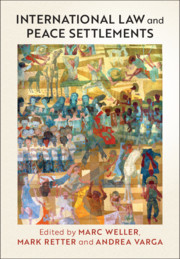Book contents
- International Law and Peace Settlements
- International Law and Peace Settlements
- Copyright page
- Contents
- Contributors
- Preface and Acknowledgements
- Case Law
- Peace Agreements and Instruments
- Abbreviations
- 1 Introduction
- Part I Historical Dimensions to Peace Settlement Practice
- Part II Peace Agreements As Legal Instruments
- Part III Key Actors and the Role of International Law
- Part IV Representation, Sovereignty and Governance
- Part V Economic Aspects of Peace Settlements
- Part VI Humanitarian Obligations and Human Rights
- 25 Negotiating the International Legal Fate of Detainees
- 26 Accountability
- 27 The Return of People and Property
- 28 Peace Settlements and Human Rights
- Conclusion
- Index
26 - Accountability
Essential for Peace or an Obstacle?
from Part VI - Humanitarian Obligations and Human Rights
Published online by Cambridge University Press: 14 January 2021
- International Law and Peace Settlements
- International Law and Peace Settlements
- Copyright page
- Contents
- Contributors
- Preface and Acknowledgements
- Case Law
- Peace Agreements and Instruments
- Abbreviations
- 1 Introduction
- Part I Historical Dimensions to Peace Settlement Practice
- Part II Peace Agreements As Legal Instruments
- Part III Key Actors and the Role of International Law
- Part IV Representation, Sovereignty and Governance
- Part V Economic Aspects of Peace Settlements
- Part VI Humanitarian Obligations and Human Rights
- 25 Negotiating the International Legal Fate of Detainees
- 26 Accountability
- 27 The Return of People and Property
- 28 Peace Settlements and Human Rights
- Conclusion
- Index
Summary
The place of accountability for human rights violations in peace processes is hotly contested. Accountability measures are routinely conceived as both an essential component of peace and as an obstacle to its achievement. This chapter examines the role of accountability in the pursuit of peace in legal, theoretical, and empirical terms. It argues that in the absence of empirical consensus on the contribution made by accountability measures to the pursuit of peace, assessments of their role are largely normative and depend on precisely how peace and accountability are themselves conceived. That is, it argues that although broadly conceived accountability is an essential component of positive, consolidated peace, its imposition in the form of prosecutions and punishment during peace negotiations may be detrimental to the achievement of minimal, negative peace, marked by the cessation of hostilities.
- Type
- Chapter
- Information
- International Law and Peace Settlements , pp. 602 - 626Publisher: Cambridge University PressPrint publication year: 2021

